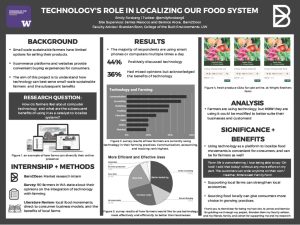Computer Technology’s Role in Localizing Food Systems
Inspired by local food movements, this research project explores the ways in which technology can eliminate barriers to sourcing food from your community. The aim of this study was to understand how the internet, websites, and ecommerce platforms could play a role in (re)localizing food systems. I interned with Barn2Door (B2D), a local software startup building ecommerce platforms and websites for farmers to sell food directly online to their local communities. My internship responsibilities included lead list building, a marketing email stream, and general market research. With the help of B2D, I surveyed 90 farmers about their opinions on technology and its integration with farming. Finally, I completed an in depth literature review of academic journals related to my research question. From the survey results, I found that farmers have mixed feeling about the integration of technology in farming. Many noted that it was “a blessing and a curse” or a “necessary evil”. While technology can be burdensome and time consuming, almost everyone who responded said it benefitted their farm or business operation in some way- sales, marketing, communication, education. If farmers are willing to adopt websites and ecommerce platforms, the community may have an easier time accessing their food. In turn, local farming economies would be supported, consumers could be more involved in the environmental impact of food production practices, and overall people would be eating more nutritious healthy foods.
